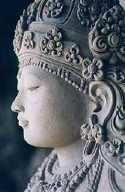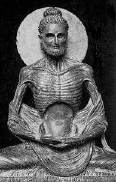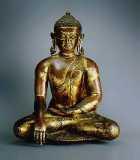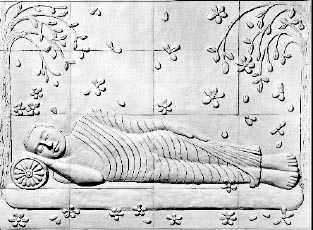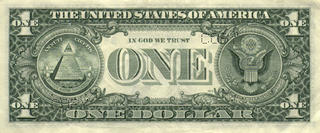Buddha Speaks
Buddha Speaks
A dog is not considered a good dog because he is a good barker. A man is not considered a good man because he is a good talker.
All that we are is the result of what we have thought. If a man speaks or acts with an evil thought, pain follows him. If a man speaks or acts with a pure thought, happiness follows him, like a shadow that never leaves him.
All things appear and disappear because of the concurrence of causes and conditions. Nothing ever exists entirely alone; everything is in relation to everything else.
All wrong-doing arises because of mind. If mind is transformed can wrong-doing remain?
Ambition is like love, impatient both of delays and rivals.
An idea that is developed and put into action is more important than an idea that exists only as an idea.
An insincere and evil friend is more to be feared than a wild beast; a wild beast may wound your body, but an evil friend will wound your mind.
Believe nothing, no matter where you read it, or who said it, no matter if I have said it, unless it agrees with your own reason and your own common sense.
Better than a thousand hollow words, is one word that brings peace.
Chaos is inherent in all compounded things. Strive on with diligence.
Do not dwell in the past, do not dream of the future, concentrate the mind on the present moment.
Do not overrate what you have received, nor envy others. He who envies others does not obtain peace of mind.
Ennui has made more gamblers than avarice, more drunkards than thirst, and perhaps as many suicides as despair.
Every human being is the author of his own health or disease.
Hatred does not cease by hatred, but only by love; this is the eternal rule.
He is able who thinks he is able.
He who experiences the unity of life sees his own Self in all beings, and all beings in his own Self, and looks on everything with an impartial eye.
He who loves 50 people has 50 woes; he who loves no one has no woes.
Health is the greatest gift, contentment the greatest wealth, faithfulness the best relationship.
Holding on to anger is like grasping a hot coal with the intent of throwing it at someone else; you are the one who gets burned.
However many holy words you read,However many you speak,What good will they do youIf you do not act on upon them?
I do not believe in a fate that falls on men however they act; but I do believe in a fate that falls on them unless they act.
I never see what has been done; I only see what remains to be done.
In a controversy the instant we feel anger we have already ceased striving for the truth, and have begun striving for ourselves.
In the sky, there is no distinction of east and west; people create distinctions out of their own minds and then beleive them to be true.
It is a man's own mind, not his enemy or foe, that lures him to evil ways.
It is better to conquer yourself than to win a thousand battles. Then the victory is yours. It cannot be taken from you, not by angels or by demons, heaven or hell.
It is better to travel well than to arrive.
Just as a candle cannot burn without fire, men cannot live without a spiritual life.
Just as treasures are uncovered from the earth, so virtue appears from good deeds, and wisdom appears from a pure and peaceful mind. To walk safely through the maze of human life, one needs the light of wisdom and the guidance of virtue.
Let us rise up and be thankful, for if we didn't learn a lot today, at least we learned a little, and if we didn't learn a little, at least we didn't get sick, and if we got sick, at least we didn't die; so, let us all be thankful.
On life's journey faith is nourishment, virtuous deeds are a shelter, wisdom is the light by day and right mindfulness is the protection by night. If a man lives a pure life, nothing can destroy him.
Peace comes from within. Do not seek it without.
Teach this triple truth to all: A generous heart, kind speech, and a life of service and compassion are the things which renew humanity.
The foot feels the foot when it feels the ground.
The only real failure in life is not to be true to the best one knows.
The secret of health for both mind and body is not to mourn for the past, nor to worry about the future, but to live the present moment wisely and earnestly.
The tongue like a sharp knife... Kills without drawing blood.
The virtues, like the Muses, are always seen in groups. A good principle was never found solitary in any breast.
The wise ones fashioned speech with their thought, sifting it as grain is sifted through a sieve.
The world, indeed, is like a dream and the treasures of the world are an alluring mirage! Like the apparent distances in a picture, things have no reality in themselves, but they are like heat haze.
There are five things which no one is able to accomplish in this world: first, to cease growing old when he is growing old; second, to cease being sick; third, to cease dying; fourth, to deny dissolution when there is dissolution; fifth, to deny non-being.
There are only two mistakes one can make along the road to truth; not going all the way, and not starting.
There is nothing more dreadful than the habit of doubt. Doubt separates people. It is a poison that disintegrates friendships and breaks up pleasant relations. It is a thorn that irritates and hurts; it is a sword that kills.
Those who are free of resentful thoughts surely find peace.
Thousands of candles can be lighted from a single candle, and the life of the candle will not be shortened. Happiness never decreases by being shared.
Three things cannot be long hidden: the sun, the moon, and the truth.
To be idle is a short road to death and to be diligent is a way of life; foolish people are idle, wise people are diligent.
To enjoy good health, to bring true happiness to one's family, to bring peace to all, one must first discipline and control one's own mind. If a man can control his mind he can find the way to Enlightenment, and all wisdom and virtue will naturally come to him.
To live a pure unselfish life, one must count nothing as one's own in the midst of abundance.
Unity can only be manifested by the Binary. Unity itself and the idea of Unity are already two.
Virtue is persecuted more by the wicked than it is loved by the good.
We are formed and molded by our thoughts. Those whose minds are shaped by selfless thoughts give joy when they speak or act. Joy follows them like a shadow that never leaves them.
We are what we think. All that we are arises with our thoughts. With our thoughts, we make the world.
What is the appropriate behavior for a man or a woman in the midst of this world, where each person is clinging to his piece of debris? What's the proper salutation between people as they pass each other in this flood?
What we think, we become.
Whatever words we utter should be chosen with care for people will hear them and be influenced by them for good or ill.
When one has the feeling of dislike for evil, when one feels tranquil, one finds pleasure in listening to good teachings; when one has these feelings and appreciates them, one is free of fear.
Without health life is not life; it is only a state of langour and suffering - an image of death.
Work out your own salvation. Do not depend on others.
You can search throughout the entire universe for someone who is more deserving of your love and affection than you are yourself, and that person is not to be found anywhere. You yourself, as much as anybody in the entire universe deserve your love and affection.
You, yourself, as much as anybody in the entire universe, deserve your love and affection.
Your work is to discover your world and then with all your heart give yourself to it.
A dog is not considered a good dog because he is a good barker. A man is not considered a good man because he is a good talker.
All that we are is the result of what we have thought. If a man speaks or acts with an evil thought, pain follows him. If a man speaks or acts with a pure thought, happiness follows him, like a shadow that never leaves him.
All things appear and disappear because of the concurrence of causes and conditions. Nothing ever exists entirely alone; everything is in relation to everything else.
All wrong-doing arises because of mind. If mind is transformed can wrong-doing remain?
Ambition is like love, impatient both of delays and rivals.
An idea that is developed and put into action is more important than an idea that exists only as an idea.
An insincere and evil friend is more to be feared than a wild beast; a wild beast may wound your body, but an evil friend will wound your mind.
Believe nothing, no matter where you read it, or who said it, no matter if I have said it, unless it agrees with your own reason and your own common sense.
Better than a thousand hollow words, is one word that brings peace.
Chaos is inherent in all compounded things. Strive on with diligence.
Do not dwell in the past, do not dream of the future, concentrate the mind on the present moment.
Do not overrate what you have received, nor envy others. He who envies others does not obtain peace of mind.
Ennui has made more gamblers than avarice, more drunkards than thirst, and perhaps as many suicides as despair.
Every human being is the author of his own health or disease.
Hatred does not cease by hatred, but only by love; this is the eternal rule.
He is able who thinks he is able.
He who experiences the unity of life sees his own Self in all beings, and all beings in his own Self, and looks on everything with an impartial eye.
He who loves 50 people has 50 woes; he who loves no one has no woes.
Health is the greatest gift, contentment the greatest wealth, faithfulness the best relationship.
Holding on to anger is like grasping a hot coal with the intent of throwing it at someone else; you are the one who gets burned.
However many holy words you read,However many you speak,What good will they do youIf you do not act on upon them?
I do not believe in a fate that falls on men however they act; but I do believe in a fate that falls on them unless they act.
I never see what has been done; I only see what remains to be done.
In a controversy the instant we feel anger we have already ceased striving for the truth, and have begun striving for ourselves.
In the sky, there is no distinction of east and west; people create distinctions out of their own minds and then beleive them to be true.
It is a man's own mind, not his enemy or foe, that lures him to evil ways.
It is better to conquer yourself than to win a thousand battles. Then the victory is yours. It cannot be taken from you, not by angels or by demons, heaven or hell.
It is better to travel well than to arrive.
Just as a candle cannot burn without fire, men cannot live without a spiritual life.
Just as treasures are uncovered from the earth, so virtue appears from good deeds, and wisdom appears from a pure and peaceful mind. To walk safely through the maze of human life, one needs the light of wisdom and the guidance of virtue.
Let us rise up and be thankful, for if we didn't learn a lot today, at least we learned a little, and if we didn't learn a little, at least we didn't get sick, and if we got sick, at least we didn't die; so, let us all be thankful.
On life's journey faith is nourishment, virtuous deeds are a shelter, wisdom is the light by day and right mindfulness is the protection by night. If a man lives a pure life, nothing can destroy him.
Peace comes from within. Do not seek it without.
Teach this triple truth to all: A generous heart, kind speech, and a life of service and compassion are the things which renew humanity.
The foot feels the foot when it feels the ground.
The only real failure in life is not to be true to the best one knows.
The secret of health for both mind and body is not to mourn for the past, nor to worry about the future, but to live the present moment wisely and earnestly.
The tongue like a sharp knife... Kills without drawing blood.
The virtues, like the Muses, are always seen in groups. A good principle was never found solitary in any breast.
The wise ones fashioned speech with their thought, sifting it as grain is sifted through a sieve.
The world, indeed, is like a dream and the treasures of the world are an alluring mirage! Like the apparent distances in a picture, things have no reality in themselves, but they are like heat haze.
There are five things which no one is able to accomplish in this world: first, to cease growing old when he is growing old; second, to cease being sick; third, to cease dying; fourth, to deny dissolution when there is dissolution; fifth, to deny non-being.
There are only two mistakes one can make along the road to truth; not going all the way, and not starting.
There is nothing more dreadful than the habit of doubt. Doubt separates people. It is a poison that disintegrates friendships and breaks up pleasant relations. It is a thorn that irritates and hurts; it is a sword that kills.
Those who are free of resentful thoughts surely find peace.
Thousands of candles can be lighted from a single candle, and the life of the candle will not be shortened. Happiness never decreases by being shared.
Three things cannot be long hidden: the sun, the moon, and the truth.
To be idle is a short road to death and to be diligent is a way of life; foolish people are idle, wise people are diligent.
To enjoy good health, to bring true happiness to one's family, to bring peace to all, one must first discipline and control one's own mind. If a man can control his mind he can find the way to Enlightenment, and all wisdom and virtue will naturally come to him.
To live a pure unselfish life, one must count nothing as one's own in the midst of abundance.
Unity can only be manifested by the Binary. Unity itself and the idea of Unity are already two.
Virtue is persecuted more by the wicked than it is loved by the good.
We are formed and molded by our thoughts. Those whose minds are shaped by selfless thoughts give joy when they speak or act. Joy follows them like a shadow that never leaves them.
We are what we think. All that we are arises with our thoughts. With our thoughts, we make the world.
What is the appropriate behavior for a man or a woman in the midst of this world, where each person is clinging to his piece of debris? What's the proper salutation between people as they pass each other in this flood?
What we think, we become.
Whatever words we utter should be chosen with care for people will hear them and be influenced by them for good or ill.
When one has the feeling of dislike for evil, when one feels tranquil, one finds pleasure in listening to good teachings; when one has these feelings and appreciates them, one is free of fear.
Without health life is not life; it is only a state of langour and suffering - an image of death.
Work out your own salvation. Do not depend on others.
You can search throughout the entire universe for someone who is more deserving of your love and affection than you are yourself, and that person is not to be found anywhere. You yourself, as much as anybody in the entire universe deserve your love and affection.
You, yourself, as much as anybody in the entire universe, deserve your love and affection.
Your work is to discover your world and then with all your heart give yourself to it.
